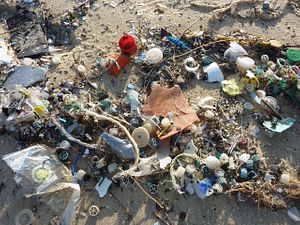Plastic waste is wreaking havoc on natural and human settings, clogging urban drainage systems, befouling rivers and oceans, and exacerbating floods. Plastic bag bans are an appropriate initial step. Still, broader initiatives can be taken such as London retailers’ commitment to “plastic-free zones” and New Zealand’s plastic-free “unwrapped” program in supermarkets. These efforts are creative extensions of what is said be the world’s first plastic-free supermarket aisle in the Netherlands.
As blunt policy instruments, bans on or extra charges for plastic bags have mixed results. After the 2015 introduction of a surcharge in the United Kingdom, the number of plastic bags sold by retailers fell precipitously. On the other hand, a 2002 ban on plastic bags in Dhaka, Bangladesh appears to have accomplished little. In Kenya, a similar ban has been irregularly enforced and resulted in illegal smuggling by “bag cartels.”
Such bans also threaten some industries; a plastic bag factory on the outskirts of Bangkok saw a 90 percent drop in orders during the first month of Thailand’s ban. With thousands of jobs on the line, industry groups are fighting back with claims about insufficient recycling processes, complaints about the immediacy of the ban, and proposals to manufacture thicker bags that can be reused before being recycled.
Although bans and packaging regulations address how plastic enters the consumption cycle, plastic waste management also deserves attention. For example, despite the recyclability of some plastic packaging, the proliferation of “clamshell” packaging frustrates the recycling process. Further, Southeast Asia’s region-wide real estate frenzy, fueled by tourism and property investment, generates substantial amounts of construction waste that is often burned on-site — an expeditious method for waste disposal that unfortunately releases airborne toxins.
Governments are struggling. Policy constraints plaguing most Southeast Asian countries include incomplete foresight about peripheral impacts, incompatibility of new policies with entrenched systems, and uncertain durability and effectiveness of those policies. Academia and the commentariat offer other explanations including fiscal limitations, poor coordination, corruption and graft, regulatory loopholes, and weak political will. These factors limit the ability of Southeast Asian countries to comply with 2019 amendments to the Basel Convention that target plastic waste.
Better models elsewhere offer hope. In Scandinavia, environmental stewardship is arguably a core expression of societal identity — from Copenhagen’s crowded bicycle lanes to Sweden’s forest-getaway stugas. Scandinavia is also a leader in reducing plastic waste. Denmark’s 1993 introduction of a tax on plastic bags was the world’s first. Sweden recently sought to enact plastic bans that exceed in scope and stringency those declared by the European Union. Hailed for embracing a “radical” approach, Norway combines plastic bottle deposit schemes and tax-based producer incentives with the cultivation of a mindset that plastic containers are “on loan” to consumers.
The concepts of extended producer responsibility and circular economy provide useful frameworks for policy design. My recent co-authored study points to policy options that include liberalization of trading platforms for cycling waste into production inputs, material flow accounting databases at regional and global levels, and wider adoption of producer norms and standards through the coercive power of industry associations.
The voice and will of the public can be similarly powerful. In Scandinavia and other democratic countries, demand for green initiatives comes as much from the ground-up as from government declarations and global initiatives like the Sustainable Development Goals. Scholars have theorized this phenomenon with the “environmental Kuznets curve,” depicting, somewhat controversially, environmental degradation as lowest in both least developed and most developed countries. The upshot is that economic growth and progress on plastic elimination are not mutually exclusive.
Still, households are slow to adopt recycling even in Asia’s wealthiest cities. Wealthier countries are more prolific consumers and fiscal space allows them to buy their way out of problems by externalizing and offshoring waste processing. In recipient countries, growing political antipathy is targeting waste import schemes, with recent examples in the Philippines, Malaysia and China.
This February, Singapore adopted stricter protocols on transboundary movement of certain types of plastic waste. Indonesia recently announced efforts to eliminate plastic pollution by 2040 through product redesign, wider coverage of waste collection, and expanded waste processing capacities. The crisis is now too visible to politically ignore. Countries are rushing — or stumbling — out of the gate to address it, offering useful opportunities to compare policies and observe which will work or fail.
Many citizens of rapidly developing countries in Southeast Asia recognize the virtues of environmental conservation and have mobilized where able. Environmental interests can intersect with concerns about corruption, loss of natural heritage, and destruction of environmental assets to generate powerful political movements. To mobilize action for seriously addressing the plastic apocalypse — beyond blunt technocratic plastic bag bans — it is incumbent on leaders to appeal to both a collective consciousness and a sense of personal duty.
Kris Hartley is Assistant Professor in the Department of Asian and Policy Studies at the Education University of Hong Kong. He is also non-resident fellow at the Chicago Council on Global Affairs and affiliated scholar at the Center for Government Competitiveness, Seoul National University. This article was originally published over at East Asia Forum here.

































